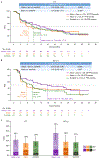Clinical activity and molecular correlates of response to atezolizumab alone or in combination with bevacizumab versus sunitinib in renal cell carcinoma
- PMID: 29867230
- PMCID: PMC6721896
- DOI: 10.1038/s41591-018-0053-3
Clinical activity and molecular correlates of response to atezolizumab alone or in combination with bevacizumab versus sunitinib in renal cell carcinoma
Erratum in
-
Publisher Correction: Clinical activity and molecular correlates of response to atezolizumab alone or in combination with bevacizumab versus sunitinib in renal cell carcinoma.Nat Med. 2018 Dec;24(12):1941. doi: 10.1038/s41591-018-0235-z. Nat Med. 2018. PMID: 30291359
Abstract
We describe results from IMmotion150, a randomized phase 2 study of atezolizumab (anti-PD-L1) alone or combined with bevacizumab (anti-VEGF) versus sunitinib in 305 patients with treatment-naive metastatic renal cell carcinoma. Co-primary endpoints were progression-free survival (PFS) in intent-to-treat and PD-L1+ populations. Intent-to-treat PFS hazard ratios for atezolizumab + bevacizumab or atezolizumab monotherapy versus sunitinib were 1.0 (95% confidence interval (CI), 0.69-1.45) and 1.19 (95% CI, 0.82-1.71), respectively; PD-L1+ PFS hazard ratios were 0.64 (95% CI, 0.38-1.08) and 1.03 (95% CI, 0.63-1.67), respectively. Exploratory biomarker analyses indicated that tumor mutation and neoantigen burden were not associated with PFS. Angiogenesis, T-effector/IFN-γ response, and myeloid inflammatory gene expression signatures were strongly and differentially associated with PFS within and across the treatments. These molecular profiles suggest that prediction of outcomes with anti-VEGF and immunotherapy may be possible and offer mechanistic insights into how blocking VEGF may overcome resistance to immune checkpoint blockade.
Figures



Comment in
-
Checkpoint inhibitor combination sets the wheels IMmotion.Nat Rev Urol. 2018 Aug;15(8):465. doi: 10.1038/s41585-018-0043-8. Nat Rev Urol. 2018. PMID: 29921907 No abstract available.
References
-
- Kaelin WG Jr. The von Hippel-Lindau gene, kidney cancer, and oxygen sensing. J. Am. Soc. Nephrol 14, 2703–2711 (2003). - PubMed
-
- George DJ & Kaelin WG Jr. The von Hippel-Lindau protein, vascular endothelial growth factor, and kidney cancer. N. Engl. J. Med 349, 419–421 (2003). - PubMed
-
- Clark JI et al. Impact of sequencing targeted therapies with high-dose interleukin-2 immunotherapy: an analysis of outcome and survival of patients with metastatic renal cell carcinoma from an on-going observational Il-2 clinical trial: PROCLAIMSM. Clin. Genitourin. Cancer 15, 31–41.e4 (2017). - PMC - PubMed
Publication types
MeSH terms
Substances
Grants and funding
LinkOut - more resources
Full Text Sources
Other Literature Sources
Medical
Research Materials

